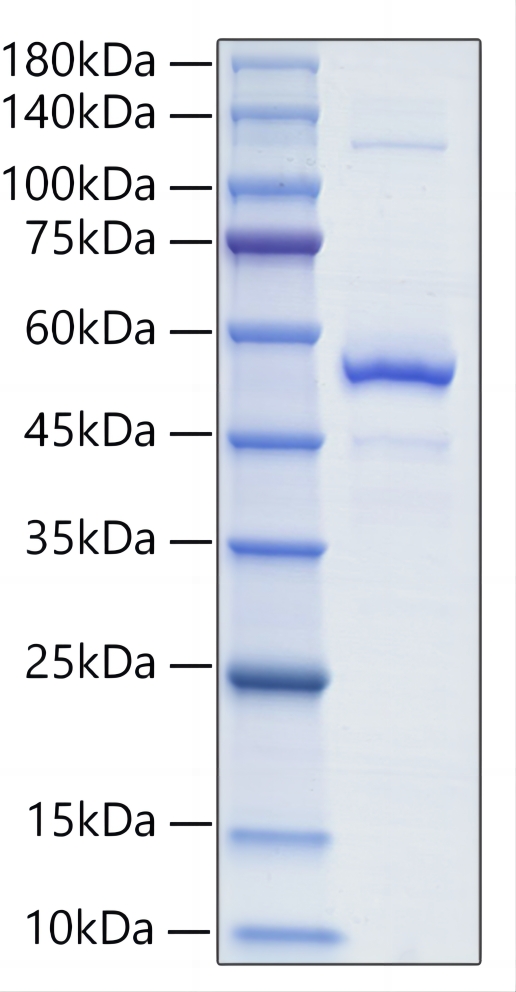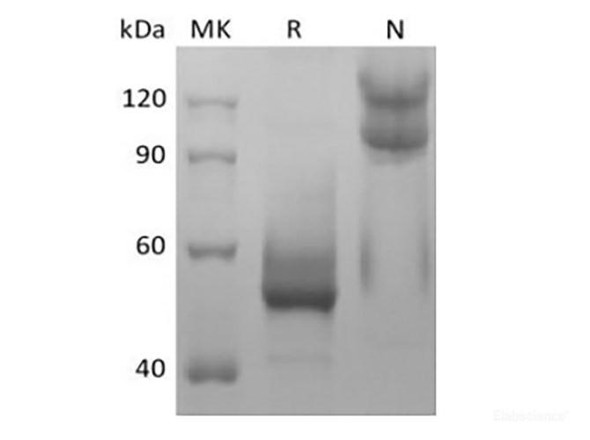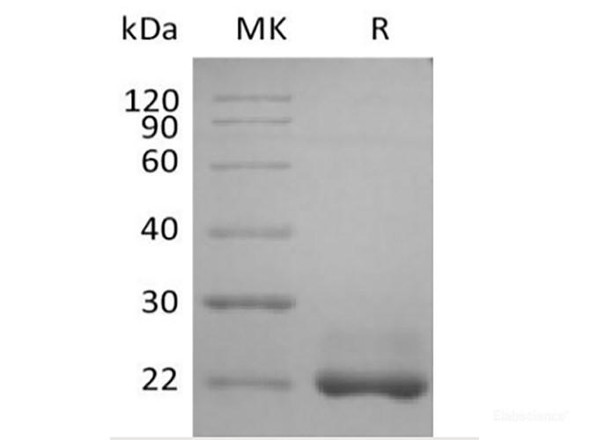Description
Recombinant Mouse TNFSF13B/BAFF/CD257 Protein
The Recombinant Mouse TNFSF13B/BAFF/CD257 Protein is a high-quality recombinant protein designed for murine biological research applications. This protein serves as an essential reagent in mouse model studies, comparative immunology research, and preclinical therapeutic evaluations, enabling scientists to investigate TNFSF13B/BAFF/CD257 biology and its relevance to human disease mechanisms through translational research approaches.
This product (SKU: RPCB1329) is produced using advanced expression systems and features a N-his&hFC tag for convenient detection and purification. The protein exhibits a calculated molecular weight of 47.41 kDa with an observed molecular weight of 50-60kDa under denaturing conditions, achieving ≥ 85% as determined by SDS-PAGE., ensuring exceptional quality and consistency for research applications.
Key Features
| High Purity by Affinity Chromatography | |
| Mammalian & Bacterial Expression Systems | |
| High lot-to-lot consistency via strict QC |
| Product Name: | Recombinant Mouse TNFSF13B/BAFF/CD257 Protein |
| SKU: | RPCB1329 |
| Size: | 10 μg |
| Reactivity: | Mouse |
| Synonyms: | Tnfsf13b, Baff,Tumor necrosis factor ligand superfamily member 13B, B-cell-activating factor, BAFF, CD257, Cleaved into: Tumor necrosis factor ligand superfamily member 13b, membrane form, Tumor necrosis factor ligand superfamily member 13b, soluble form |
| Tag: | N-his&hFC |
| Calculated MW: | 47.41 kDa |
| Observed MW: | 50-60kDa |
| Gene ID: | 24099 |
| Protein Description: | High quality, high purity and low endotoxin recombinant Recombinant Mouse TNFSF13B/BAFF/CD257 Protein (RPCB1329), tested reactivity in HEK293 cells and has been validated in SDS-PAGE.100% guaranteed. |
| Endotoxin: | < 0.01 EU/μg of the protein by LAL method |
| Purity: | ≥ 85% as determined by SDS-PAGE. |
| Formulation: | Lyophilized from a 0.22 μm filtered solution of PBS, pH 7.4. |
| Reconstitution: | Centrifμge the vial before opening. Reconstitute to a concentration of 0.1-0.5 mg/mL in sterile distilled water. Avoid vortex or vigorously pipetting the protein. For long term storage, it is recommended to add a carrier protein or stablizer (e.g. 0.1% BSA, 5% HSA, 10% FBS or 5% Trehalose), and aliquot the reconstituted protein solution to minimize free-thaw cycles. |
| Storage: | Store at -20℃.Store the lyophilized protein at -20℃ to -80 ℃ up to 1 year from the date of receipt. After reconstitution, the protein solution is stable at -20℃ for 3 months, at 2-8℃ for up to 1 week. |
B-cell activating factor (BAFF), also known as BLyS, TALL-1, THANK, and TNFSF13B, is a 32 kDa transmembrane glycoprotein in the TNF ligand superfamily. It is involved in multiple aspects of immune system regulation, particularly towards B cells. Mature mouse BAFF consists of a 47 amino acid (aa) cytoplasmic domain, a 21 aa transmembrane segment, and a 241 aa extracellular domain (ECD) with a stalk region and one TNF-like domain. Within aa 127-309 of the ECD, mouse BAFF shares 72% aa sequence identity with human BAFF. It can be expressed as a homotrimer or as a heteromer in association with the related TNFSF member APRIL. A 18 kDa fragment containing the TNF-like domain can be released by proteolysis between Arg126 and Ala127. Soluble BAFF is stored intracellularly in neutrophils and released upon inflammatory stimulation. deltaBAFF can form heteromers with BAFF and negatively regulates BAFF function. BAFF is produced by many hematopoietic cell types including by monocytes, macrophages, neutrophils, dendritic cells, and T cells and also by adipocytes. Both BAFF and APRIL are functional ligands for the TNF receptor superfamily members BCMA and TACI, and BAFF additionally binds and signals through BAFF R. All three receptors are primarily expressed by B cells. BAFF plays a critical role in the development and survival of B lineage cells. Mice that over-express BAFF exhibit elevated B cell numbers, increased formati of germinal centers, and symptoms of autoimmunity. Soluble BAFF is elevated in B cell malignancies, autoimmunity, and other immune disorders. In addition, BAFF costimulates T cell activation, promotes a Th1 biased immune response, and promotes the expansion of Treg cells. BAFF also promotes monocyte survival, proinflammatory cytokine secretion, and differentiation to macrophages.







